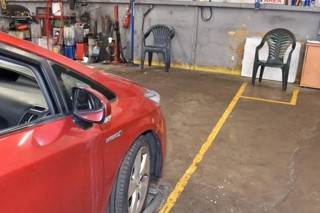A conference to brief senior motor industry managers on Block Exemption – The future of franchising – was staged by Sewells Information & Research at the National Motorcycle Museum, Birmingham. It was chaired by Ron Sewell who founded Sewells International 40 years ago. The business is now part of Emap Automotive, which includes Automotive Management. Mr Sewell last month became the first person to receive a lifetime service award from the Institute of the Motor Industry. He told the IMI annual dinner: “This means a great deal to me – it is a humbling experience.” The citation praised Mr Sewell's commitment to training and professional development. Opening the Block Exemption conference, Mr Sewell said many people who had built a dealer group felt concerned about the future. “Last year was not particularly good for many people,” he said.
“This year hopefully will be better but we live in an era of uncertainty.”
Retailers 'afraid to rock the boat'
Most dealers were “pretty powerless” to play a significant part in Block Exemption review because the power and their destiny is more in the hands of manufacturers, said Clive Sutton.
The head of the London Chrysler Jeep group bearing his name said at the Sewells conference, Block Exemption - the future of franchising: “Many key dealer players are not keen to speak out publicly. They do not want to upset some of their manufacturers and risk affecting their share price by loss of dealerships as well as a lack of profits.”
Mr Sutton said current Block Exemption had failed to be effective for dealers or consumers but he believed there was a need for the market to continue to be regulated. This was for the benefit of dealers, manufacturers and consumers.
“Deregulation has in many other business sectors been the cause of abandonment of quality and safety standards in pursuit of bottom line reward,” he said. “Quality of service becomes premium-priced and basic rate service is simply not good enough.”
Mr Sutton believed any pan-European legislation should be driven by giving consumers consistent product pricing and aftersales service.
One intention of the 1995 legislation was to provide dealers with some independence from manufacturers, but this was not achieved.
Some manufacturers were pursuing their own programmes of change to protect their positions in case the revision brought significant change. Others were pursuing policies regardless of any change.
Carmakers effectively controlled franchised networks through the dealer agreement which generally had a two-year notice. “With contracts so short relative to the investments made and expected by dealers, it is no wonder dealers do not want to rock the boat,” Mr Sutton said.
He believed dealers making investments in premises and facilities that ultimately benefited consumers should be awarded exclusivity to sell the brand in that area.
New legislation should allow dealers to multi-franchise with lower costs than at present, as long as manufacturer branding could be zoned effectively to protect its impact.
Mr Sutton said consumers had grouped dealers with manufacturers as one channel of car sales that could not be trusted, even though retailers were not responsible for pricing disparities.
Block Exemption has created 'world class' buyer support
Car manufacturers have a responsibility to their owner bases, said Tod Evans, managing director of Peugeot UK.
“We have to have a framework where whole life costs forecasts can be achieved,” he said. “As prices are reduced, there will be the issue of how existing owners are affected in terms of the value of their new car asset.
“In our view, Block Exemption has created a world-class system for serving our customers well. So let's just take stock as to what this offers to consumers.”
Mr Evans said manufacturers offered tremendous value for money through high levels of inter- and intra-brand competition between makes and between dealers. They also offered highly trained dedicated product expertise in geographically convenient locations across the UK.
“All the products developed by the brand are available for sale through the dedicated network,” he said.
“The network holds itself accountable and responsible with the manufacturer for an effective system of aftersales support. This is the classic franchise system in full flow, serving consumers in the UK market.”
Mr Evans contrasted motor dealers with white goods retailers who seemed to be clustered in three or four national organisations. This contrasted with multi-ownership in car distribution.
He did not think there was any real price competition in white goods.
“You must have been struck as to how similar white goods prices are, even down to the 'manager's offer of the month', which seemed to be an identical product at an identical price, no matter which branch of outlet you went to,” said Mr Evans.
Advertised lines were frequently not in stock and aftersales care was invariably sub-contracted to another organisation. “The cost of extended warranties are horrific and the call out charges defy belief,” he said.
“We are comparing our regulated system to another that has been deregulated and left to market forces.”
Mr Evans said it was difficult to determine whether consumers – “this group we are anxious to serve” – like the car buying and car servicing experience. The problem was that most market research surveys did not have a reference benchmark to be able to answer the question.
EC believes in powerful car dealers
European Commissioners want bigger, stronger dealer groups, said Marc Greven, director of legal affairs at Acea, the European vehicle manufacturers association.
“The question is how you achieve that,” he said. “It could be by giving dealers stronger protection in terms of longer notice periods, or by allowing them to grow their business. Or through multi-franchising or selling into other territories.”
In the US, dealer groups had grown mostly by strict state franchise laws giving strong protection to dealers.
“It's not certain Europe will go exactly the same way,” said Mr Greven. “If you are to allow new players to come in, how do you ensure the comprehensive service car drivers need will still be available.”
Online companies were not exactly the same type of business as dealers with big showrooms and service facilities.
Standards applying to them should be “a little more than just a corporate logo on the website”.
Mr Greven said Block Exemption discussions were more advanced in the UK than in Brussels. Following a “semi-public” hearing in February, the EC was conducting more research and analysing five scenarios. These ranged from almost no change to a complete free-for-all.
“Before making any legislative proposals, they will want to understand what the implications might be of each of these scenarios,” he said. “They hope, probably in late autumn, they can come forward with a proposal. In the middle of next year the Commission will have to make a decision.”
RMI wants 'a measure of protection' for networks
Retail Motor Industry Federation chief executive David Evans said he expected Block Exemption to be renewed but added: “It would be naive to suppose it will be the same as now.”
Changes were needed and it would be the collective task of the industry to work for greater efficiency. Maintenance or improvement in standards, good training practices and customer satisfaction to secure the best regulatory framework were also important.
Mr Evans said dealers needed a measure of protection and security in view of the substantial investment required in providing what manufacturers demanded and customers expected.
Authorised dealers knew how to deal with their customers and should be free to run their businesses within regulatory framework without being over dependent on suppliers.
“Brand image is promoted and customer satisfaction fulfilled by authorised dealers,” he said. “The system is regarded as the best means of ensuring customer satisfaction but the lack of security with only two years' notice at most – and, depending on circumstances, sometimes less – is not good enough.”
It would be economically inefficient to permit an unlimited number of retailers for new vehicles, said Mr Evans. “It may be assumed many of them would wish to limit their interest to the best selling models, or particular ones without having to provide a full range – and not necessarily to provide an aftersales service,” he said.
If this happened, he thought the maintenance of quality standards and the viability of dedicated authorised dealers would be seriously undermined.
Beware gap, says Pulham
National Franchised Dealers Association director Alan Pulham said he was concerned about a lengthy implementation period before a revised Block Exemption.
He was speaking from the floor during a question and answer session and commenting on comments by Marc Greven of Acea. In 1995, the previous regulation ran out two days before its official end and the EC allowed a 15-month implementation period before the new regulation.
“During that period, we must have see some of the greatest abuses of power,” said Mr Pulham. “Dealers were shown high hurdles they had to jump over before they could be guaranteed a new agreement.
“I wonder whether that is to be replicated in 2002, going through into 2003.”
Mr Pulham said he was describing a limbo period when one regulation was still short of fading away and the new one had not arrived. This left dealers awaiting a new contract.
“They don't know what the new contract is necessarily going to look like but they are sitting there with a multi-million pound investment. Maybe they have 100 staff.
“They are trying to organise their business and they are left in a difficult situation with hurdles being put in front of them.
“I believe, in that period of time, they desperately need a 'court of last resort' to go to if something is seen as unfair.”
The NFDA, through the Retail Motor Industry Federation, is playing a full part in formulating a UK car retail document to present to the EC.
Consumers' Association to launch BE manifesto
The Consumers' Association is preparing a Block Exemption manifesto, said senior policy adviser Phil Evans.
“The manifesto will be launched soon as our contribution to the debate,” he said. “It is important we have a debate outside the motor industry. European regulators want to see change but they are not sure how to achieve it.
“Vehicle manufacturers ignored and undermined the current Block Exemption. But some manufacturers are ready to change.”
Mr Evans said major changes were underway in high street retailing and these needed to be reflected in the way the motor industry operated.
“Someone has to develop real alternatives to the present system.”
One car manufacturer senior executive said afterwards: “The last thing we want is for the Consumers' Association to take over the debate on Block Exemption.
“We allowed that to happen over prices but it must not be the case this time.”
Courts can rule on contract disputes
Dealers who felt manufacturers had terminated their agreements in an unsatisfactory way could take action in court for breach of contract, said Dr Stephan Pukas.
“Dealers enter into these contracts voluntarily – no one forces a dealer to sign up to a manufacturer's contract,” said Dr Pukas, an Office of Fair Trading case officer.
He confirmed afterwards he was referring to DaimlerChrysler UK's 12-month termination of the whole Mercedes-Benz network.
He said entering into contracts with manufacturers was a commercial decision for dealers. “If dealers do not like new terms a manufacturer proposes, they are not obliged to take them up,” he said. “So there is not a lot on that front where we can help dealers.
“It comes down to contractual terms,” he said. “If a manufacturer's conditions are so severe no dealer wishes to take them up, that's a risk it takes, but in every respect it's a commercial decision.”
Dr Pukas said the new Competition Act enabled the OFT to take more effective action against anti-competitive activity. There should be better protection for the victims but he added: “Nothing is fair in business.”
Ultimately, it was for the Competition Commission and the courts to decide what was allowable.
Whatever the EC decided the outcome of its review would apply across Europe. Taxes in different countries influenced prices, strategies and manufacturers but he added: “They are a given, not within the ambit of the EC competition directorate nor, in fact, the UK.”
Expect more high-profile retail exits, warns Ryan
The automotive industry was over-supplied at every level, said Gerard Ryan, managing director of GE Capital Woodchester, the conference sponsor.
Block Exemption was a key issue but not the only major factor, with considerable consolidation of manufacturers, dealers and finance houses.
“We are going to see an acceleration of this over the coming years,” said Mr Ryan. “We have had high-profile dealer group exits and I think more will occur in the next 12 months due to issues of cashflow and management and strategy, not profitability.”
It was early days for new distribution channels and all in the industry should be mindful of how they could lever them for their own benefit, he said.

















Login to comment
Comments
No comments have been made yet.